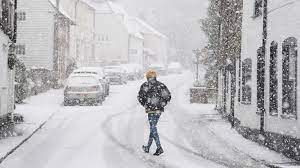According to the Met Office, there will be frequent snow showers on Thursday that could cause problems with communications, power, and transportation in the Northern Isles and northwest Scotland.
In all four UK countries, there are also yellow warnings for ice and snow.
Wednesday might be the coldest January night in fourteen years, according to forecasters.
Temperatures are predicted to remain low through the weekend due to a cold front that has moved in from the Arctic.
The lowest night of the winter so far was Tuesday, when Dalwhinnie in the Scottish Highlands recorded a low of -14C (6.8F).
Scotland could experience lows of -15C (5.0F) on Wednesday, according to forecasters, making it the coldest January night since 2010.
Temperatures of -11C (12.2F) in England, -8C (17.6F) in Wales, and -3C (26.6F) in Northern Ireland were also reported in preliminary readings.
The additional drop in temperature, according to BBC Weather’s Chris Fawkes, is the “sting in the tale” before the cold snap ends.
“There will be an additional 5 to 15 cm of snow in northern Scotland, along with wind gusts of 40 to 50 mph.” Anticipate severe snow drifts and blizzards,” he stated.
Certain communities will become very difficult to navigate. Nearly everywhere in Scotland might receive a few centimeters of snowfall due to the stronger snow showers.”
He also said that Thursday will bring more widespread and heavier snowfall to Northern Ireland, with accumulations of 5 to 10 cm in some areas and a higher likelihood of disruptions.
Shetland, Orkney, and a large portion of Scotland north of Inverness are included in the amber warning, which went into effect on Wednesday at 15:00 GMT and will last until 18:00 on Thursday.
Additionally, there are some yellow weather warnings from the Met Office. They are as follows:
A snow and ice advisory is in effect until Thursday at 23:59 for a large portion of Northern Ireland and northern and western Scotland.
Wales’ northern and western regions are also under a snow and ice warning.
There is a snow and ice warning in effect for England’s entire eastern coast through Thursday at 12:00.
An ice warning is in effect for the southeast of England through Thursday at 10:00.
In certain areas of Scotland, schools were forced to stay closed on Wednesday due to the bitter cold and heavy snowfall.
This week, the UK Health Security Agency issued an amber cold weather alert for England, which means that increased strain will likely be placed on the NHS and that elderly individuals and those with pre-existing medical conditions may be more vulnerable.
Temperatures have dropped between 5C (41.0F) and 6C (42.8F) below the seasonal average due to chilly winds coming in from the Arctic.
“For those that don’t like the cold weather, there will be a big change this weekend as the weather turns much milder,” said Fawkes.
“Very strong, potentially disruptive winds with gusts of up to 60–70 mph in certain areas will accompany this change. Periods of intense rain may cause some areas to flood again.”







